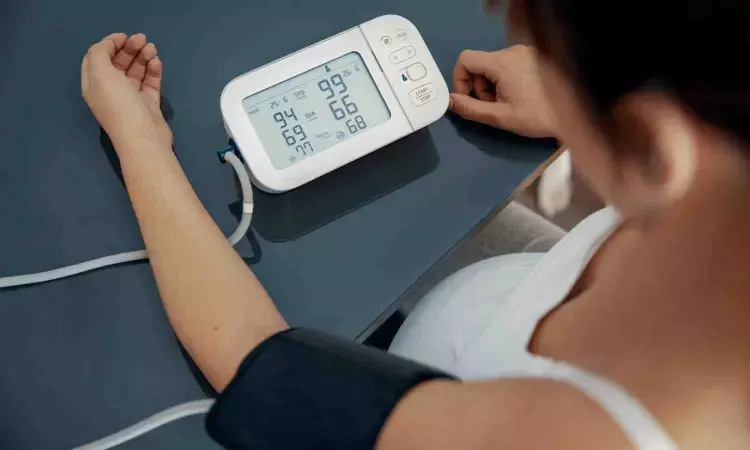- Home
- Medical news & Guidelines
- Anesthesiology
- Cardiology and CTVS
- Critical Care
- Dentistry
- Dermatology
- Diabetes and Endocrinology
- ENT
- Gastroenterology
- Medicine
- Nephrology
- Neurology
- Obstretics-Gynaecology
- Oncology
- Ophthalmology
- Orthopaedics
- Pediatrics-Neonatology
- Psychiatry
- Pulmonology
- Radiology
- Surgery
- Urology
- Laboratory Medicine
- Diet
- Nursing
- Paramedical
- Physiotherapy
- Health news
- Fact Check
- Bone Health Fact Check
- Brain Health Fact Check
- Cancer Related Fact Check
- Child Care Fact Check
- Dental and oral health fact check
- Diabetes and metabolic health fact check
- Diet and Nutrition Fact Check
- Eye and ENT Care Fact Check
- Fitness fact check
- Gut health fact check
- Heart health fact check
- Kidney health fact check
- Medical education fact check
- Men's health fact check
- Respiratory fact check
- Skin and hair care fact check
- Vaccine and Immunization fact check
- Women's health fact check
- AYUSH
- State News
- Andaman and Nicobar Islands
- Andhra Pradesh
- Arunachal Pradesh
- Assam
- Bihar
- Chandigarh
- Chattisgarh
- Dadra and Nagar Haveli
- Daman and Diu
- Delhi
- Goa
- Gujarat
- Haryana
- Himachal Pradesh
- Jammu & Kashmir
- Jharkhand
- Karnataka
- Kerala
- Ladakh
- Lakshadweep
- Madhya Pradesh
- Maharashtra
- Manipur
- Meghalaya
- Mizoram
- Nagaland
- Odisha
- Puducherry
- Punjab
- Rajasthan
- Sikkim
- Tamil Nadu
- Telangana
- Tripura
- Uttar Pradesh
- Uttrakhand
- West Bengal
- Medical Education
- Industry
Advanced endometriosis increases risk of preeclampsia and eclampsia, claims research

A new study published in the International Journal of Women's Health showed that the risk of preeclampsia and eclampsia may be increased by advanced endometriosis (ASMR stages III–IV).
Despite endometriosis's effects on reproduction have been well studied, there is still rising interest in how it may affect pregnancy outcomes, particularly hypertensive disorders of pregnancy (HDP) including preeclampsia (PE) and gestational hypertension disease (GHD). About 10% of pregnancies worldwide are affected with HDP, which includes GHD and PE. These conditions are among the most prevalent pregnancy problems.
Although the precise processes behind this relationship are yet unknown, there is growing evidence that endometriosis may be linked to an increased risk of hypertensive problems during pregnancy. Endometriosis-related immunological and inflammatory changes may disrupt placental function and lead to unfavorable pregnancy outcomes. Therefore, in order to give more conclusive insights into the link between endometriosis and hypertensive problems in pregnancy, this study intends to further analyze this relationship utilizing retrospective cohort analysis using Mendelian randomization (MR).
Using genetic variants linked to endometriosis from the Finnish database and outcome data for PE and eclampsia from the UK Biobank, a two-sample MR investigation was conducted. Subgroup analyses were carried out according to the anatomical site (uterus, ovary, deep infiltrating endometriosis) and the severity of endometriosis (American Society of Reproductive Medicine, or ASRM) stages I–II and III–IV.
To further evaluate the link, a retrospective cohort research was carried out, controlling for confounding variables such age, body mass index (BMI), uterine surgical history, dysmenorrhea, and adenomyosis. Based on the severity of endometriosis, the risk of PE/eclampsia was examined using multivariate logistic regression.
By utilizing Inverse Variance in MR, the weighted approach revealed a substantial correlation between PE/eclampsia and advanced endometriosis (ASRM stages III–IV), but not between lower stages or ovarian and uterine endometriosis.
After controlling for covariates, the original correlation between PE/eclampsia and the revised American Fertility Society (r-AFS) score in the retrospective cohort decreased. Age, dysmenorrhea, and the highest correlation with adenomyosis were shown to be significant risk factors.
Overall, the results point to a possible link between the risk of PE/eclampsia and advanced endometriosis. Age, dysmenorrhea, and adenomyosis, among other clinical characteristics, seem to have a greater impact on the risk, though.
Source:
Zu, Y., Xie, Y., Zhang, H., Chen, L., Yan, S., Wang, Z., Fang, Z., Lin, S., & Yan, J. (2025). Endometriosis severity and risk of preeclampsia: A combined Mendelian randomization and observational study. International Journal of Women’s Health, 17, 923–935. https://doi.org/10.2147/ijwh.s508174
Neuroscience Masters graduate
Jacinthlyn Sylvia, a Neuroscience Master's graduate from Chennai has worked extensively in deciphering the neurobiology of cognition and motor control in aging. She also has spread-out exposure to Neurosurgery from her Bachelor’s. She is currently involved in active Neuro-Oncology research. She is an upcoming neuroscientist with a fiery passion for writing. Her news cover at Medical Dialogues feature recent discoveries and updates from the healthcare and biomedical research fields. She can be reached at editorial@medicaldialogues.in
Dr Kamal Kant Kohli-MBBS, DTCD- a chest specialist with more than 30 years of practice and a flair for writing clinical articles, Dr Kamal Kant Kohli joined Medical Dialogues as a Chief Editor of Medical News. Besides writing articles, as an editor, he proofreads and verifies all the medical content published on Medical Dialogues including those coming from journals, studies,medical conferences,guidelines etc. Email: drkohli@medicaldialogues.in. Contact no. 011-43720751


